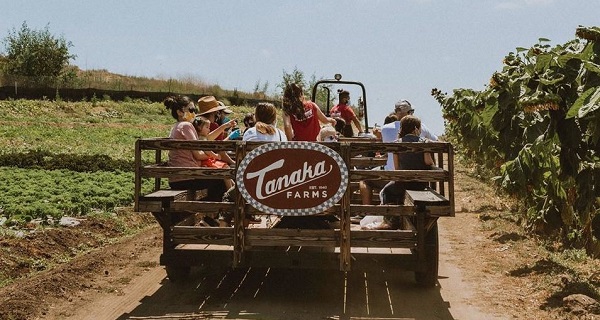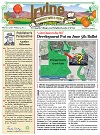
Glenn & Shirley Tanaka, left, with Christine & Ken Tanaka and their children, from left, Landon, Kaylee, and Kenji (in Ken’s arms). Photo Credit: Tanaka Farms
The Tanaka family — led by Glenn Tanaka and his son, Ken — farms three sites in Orange County, but the hub of their enterprise is the high-profile, 30-acre site at University Drive and Michelson Drive, adjacent to Strawberry Farms Golf Club.
There, the Tanakas run one of biggest farm stands in the county, complete with its own gift shop. This is where they host some 120,000 children, parents and teachers each year who come to learn about the farm and agriculture. Visitors enjoy the petting zoo, the corn maze, the wagon rides and, this month, a pick-your-own pumpkin patch. The Tanaka Grill provides hot sandwiches, sides and snacks to the public Wednesday through Sunday.
There’s also a U-Pick Vegetable Patch where visitors can get their hands dirty harvesting their own carrots, radishes, green onions and cilantro.
 “The carrots are the kids’ favorites,” says Ken. “There’s this green plant and they start to wiggle it around and lift it and a whole carrot comes out!”
“The carrots are the kids’ favorites,” says Ken. “There’s this green plant and they start to wiggle it around and lift it and a whole carrot comes out!”
A new and popular attraction for the youngsters is the Bee Train, where they ride in little train cars painted with yellow and black stripes. And coming soon is the return of the pumpkin cannon!
It all makes for a fun and educational day for kids and adults alike. And, it is the culmination of a lot of work and creative adaptation by the Tanaka family.
Glenn is a sansei, a third-generation Japanese-American. His grandfather immigrated from Hiroshima Prefecture in Japan in the early 1900s. Glenn’s father, George, did farm work like his father, but left California in 1942 after the bombing of Pearl Harbor to avoid internment when West Coast Japanese-American families were rounded-up and sent to internment camps during World War II. (This was one of the most disgraceful acts in our nation’s history.) George fled with only what he could carry to Utah, which was outside the so-called “Japanese exclusion zone.” He returned to California after the war and started all over in farming.
When Glenn took over, he says, he “wanted to be a big farmer — expand, expand, expand.” But changes in the agriculture industry squeezed family farmers and made for a difficult time, so much so that when Ken was born “I didn’t want him to be a farmer because it was too hard.”
But one day, they invited Ken’s pre-school class to visit the farm, and the kids liked it so much that the Tanakas began hosting other school groups, as a community service project. “It grew from there,” Glenn says.
 Now the agritourism and ag-education at the farm account for half its revenue and allow the Tanakas to continue farming. They have shifted to sustainable practices and started a CSA — Community Supported Agriculture — that partners with local schools to provide them with fresh produce.
Now the agritourism and ag-education at the farm account for half its revenue and allow the Tanakas to continue farming. They have shifted to sustainable practices and started a CSA — Community Supported Agriculture — that partners with local schools to provide them with fresh produce.
Most recently, the Tanakas have created a memorial to the Japanese-American families who helped build California’s agriculture and were interned during World War II in concentration camps like Manzanar in Northern California, which is now a national historical site. Four walls laid out in a square and made of wooden pallets are hung with some 100 placards, each telling one family’s story in text and photos. A sign at the top of one wall reads: “The Issei and Nissei Farmers: Their Legacy” with text explaining the contributions and hardships of first- and second-generation Japanese-Americans in California.
“The older you get, the more you think about things — preserving memories, preserving history,” said Glenn, explaining the genesis of the project. Families send text and photos, he said, and a volunteer editor and volunteer designer create and place the placards.
The humble but powerful memorial “has an impact beyond what we see,” Glenn says. “People have come to look and said, ‘That’s my uncle!’ … One day a teacher came by and started reading the stories. She was a teacher but didn’t know about the internment. She went back to her school and asked a Japanese-American teacher there about it. Now she is going for a visit to Manzanar.”
“This is our history,” Glenn concludes. “Every ethnic group has their story. This is ours.”
To learn more, visit the Tanaka Farms website by clicking here.
- Councilmember Tammy Kim Attempts to Block Surplus Funds Being Used to Support School & Family Programs - July 23, 2024
- Pretend City Children’s Museum Coming to the Great Park - July 21, 2024
- Mega-Warehouse Development in Irvine - July 20, 2024



